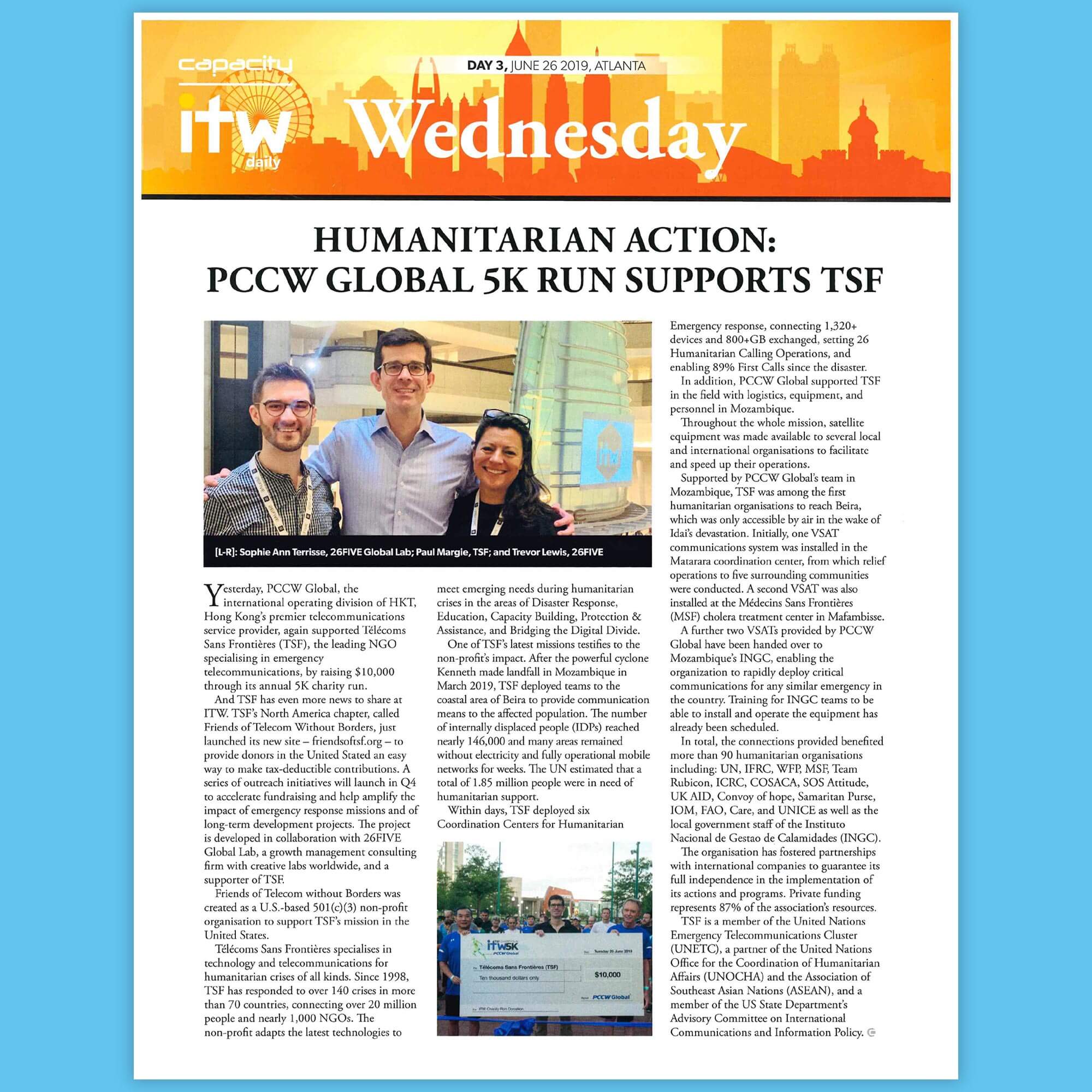Supporting TSF
As originally published in Capacity Media’s ITW 2019 Daily Magazine.
Humanitarian Action: PCCW Global 5K Run Supports TSF
 June 26, 2019, Atlanta – Yesterday, PCCW Global, the international operating division of HKT, Hong Kong’s premier telecommunications service provider, again supported Télécoms Sans Frontières (TSF), the leading NGO specialising in emergency telecommunications, by raising $10,000 through its annual 5K charity run.
June 26, 2019, Atlanta – Yesterday, PCCW Global, the international operating division of HKT, Hong Kong’s premier telecommunications service provider, again supported Télécoms Sans Frontières (TSF), the leading NGO specialising in emergency telecommunications, by raising $10,000 through its annual 5K charity run.
And TSF has even more news to share at ITW. TSF’s North America chapter, called Friends of Telecom Without Borders, just launched its new site – friendsoftsf.org – to provide donors in the United Stated an easy way to make tax-deductible contributions. A series of outreach initiatives will launch in Q4 to accelerate fundraising and help amplify the impact of emergency response missions and of long-term development projects. The project is developed in collaboration with 26FIVE Global Lab, a growth management consulting firm with creative labs worldwide, and a supporter of TSF.
Friends of Telecom without Borders was created as a U.S.-based 50l(c)(3) non-profit organisation to support TSF’s mission in the United States.
Télécoms Sans Frontières specialises in technology and telecommunications for humanitarian crises of all kinds. Since 1998, TSF has responded to over 140 crises in more than 70 countries, connecting over 20 million people and nearly 1,000 NGOs. The non-profit adapts the latest technologies to meet emerging needs during humanitarian crises in the areas of Disaster Response, Education, Capacity Building, Protection & Assistance, and Bridging the Digital Divide.
One of TSF’s latest missions testifies to the non -profit ‘s impact. After the powerful cyclone Kenneth made landfall in Mozambique in March 2019, TSF deployed teams to the coastal area of Beira to provide communication means to the affected population. The number of internally displaced people (IDPs) reached nearly 146,000 and many areas remained without electricity and fully operational mobile networks for weeks. The UN estimated that a total of 1.85 million people were in need of humanitarian support.
Within days, TSF deployed six Coordination Centers for Humanitarian Emergency response, connecting 1,320+ devices and 800+GB exchanged, setting 26 Humanitarian Calling Operations, and enabling 89% First Calls since the disaster.
In addition, PCCW Global supported TSF in the field with logistics, equipment, and personnel in Mozambique.
Throughout the whole mission, satellite equipment was made available to several local and international organisations to facilitate and speed up their operations.
Supported by PCCW Global’s team in Mozambique, TSF was among the first humanitarian organisations to reach Beira, which was only accessible by air in the wake of Idai’s devastation. Initially, one VSAT communications system was installed in the Matarara coordination center, from which relief operations to five surrounding communities were conducted. A second VSAT was also installed at the Medecins Sans Frontieres (MSF) cholera treatment center in Mafambisse.
A further two VSATs provided by PCCW Global have been handed over to Mozambique’s INGC, enabling the organization to rapidly deploy critical communications for any similar emergency in the country. Training for INGC teams to be able to install and operate the equipment has already been scheduled.
In total, the connections provided benefited more than 90 humanitarian organisations including: UN, IFRC, WFP, MSF, Team Rubicon, ICRC, COSACA, SOS Attitude, UK AID, Convoy of hope, Samaritan Purse, IOM, FAO, Care, and UNICE as well as the local government staff of the Instituto Nacional de Gestao de Calamidades (INGC).
The organisation has fostered partnerships with international companies to guarantee its full independence in the implementation of its actions and programs. Private funding represents 87% of the association’s resources.
TSF is a member of the United Nations Emergency Telecommunications Cluster (UNETC), a partner of the United Nations Office for the Coordination of Humanitarian Affairs (UNOCHA) and the Association of Southeast Asian Nations (ASEAN), and a member of the US State Department’s Advisory Committee on International Communications and Information Policy.





